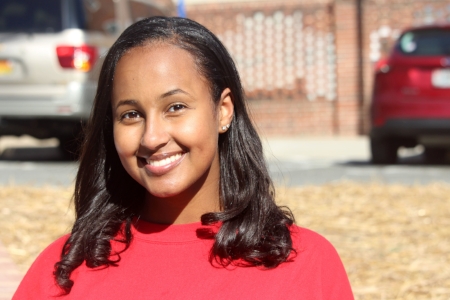A silent state of mind
Keep it inside, and keep it quiet.
Mute your mental ache.
Simmer in silence.
American youth, especially those within the Black community, learn to suppress most of their negative emotions at an early age through the lack of conversation about mental health.
“We don’t have the roots of discussing mental health and its importance from our backgrounds,” said Mahalet Samson, a freshman neurobiology and physiology double major. “It was never talked about, ever, when we were growing up. Then, when we’re thrown into high school and college with so many things that are happening to us all at once, we don’t know how to handle any of it.”
Mahalet Samson, 18, smiles for a portrait outside of the Reckford Armory in College Park, Md. on Thursday, Oct. 25, 2018. (Alexandra Glover/The Black Explosion)
Not only has our nation’s society developed an ongoing stigma around mental health and the act of reaching out for help, but an unspoken agreement has seeped into the unseen cracks within the Black populace, fostering the belief that you have to remain unwaveringly upright amid life’s unforeseeable ups and downs.
“When you’re Black, you’re expected to be strong,” said Kuami Aba, a sophomore computer science major. “Black people feel like they seem weak when they ask for help, so they tend to keep everything to themselves when there’s actually a whole bunch of other people who are dealing with the same problem.”
According to Dr. Sharon Kirkland-Gordon, the acting director of the University of Maryland Counseling Center since 2010, about 16 percent of students who received advice and guidance from the counseling center during the past few years have identified as African-American, which is notably a greater figure than the university’s percentage of registered Black students.
“Typically, students are seen for depression, anxiety, academic stress and other issues around family and familial pressures,” Dr. Kirkland-Gordon said. “Some of them may be struggling with relationships and interpersonal connections, as well as feelings of isolation and marginalization on the university’s campus.”
As an eager, ambitious freshman who is still learning how to tread the stormy waters of college life, Samson finds difficulty in maintaining a balance between her hectic schedule and her need to spend time with herself. She confessed that she appreciates how social media has taken on a more significant role in people being more vocal about their own experiences with mental health, yet doesn’t believe that enough actions are being taken in addition to the raised awareness.
“My plate is so full right now that I don’t know what to do with myself sometimes,” Samson said. “I eat crappy foods, I don’t sleep, I’m not handling things well at all. I’m just going through life day by day. Whenever I see a tweet about anxiety or stress on Twitter, I retweet it like it’s whatever, cool, funny. Sure, it brings more awareness to mental health, but at the same time, nobody’s doing anything about it.”
Many individuals possess the false notion that their struggles are unlike anybody else’s internal and external conflicts, but messy and overwhelming emotions are common sentiments that many, if not most, college students wrestle with on a regular basis. Aba experienced a mental breakdown recently after he reflected on his life’s current trajectory.
“I lowkey had a breakdown about five weeks ago, and it was mostly ’cause I reached a certain point where I was only doing school, work and rugby every day,” Aba said. “I was just like, ‘Bruh, what type of life is this? This sucks.’ Sometimes, you forget why you’re doing school and stuff, so I had to reassure myself, call my parents and read my Bible.”
Dr. Kirkland-Gordon emphasized the importance of seeking help when you need it, as the state of one’s mental health tends to worsen without an intervention. Additionally, there are numerous small, everyday methods in which students can handle their negative thoughts in a healthy way.
Dr. Sharon Kirkland-Gordon, the director of the University of Maryland Counseling Center, in her office at the Shoemaker Building in College Park, Md. on Monday, Oct. 29, 2018. (Alexandra Glover/The Black Explosion)
“We have a new app that’s called WellTrack, which is a self-help app that’s available to students whenever they want to use it,” Dr. Kirkland-Gordon said. “It focuses on helping with depression, anxiety, stress and public speaking. The other thing is creating networks of support in whatever way that is – talking to friends, being around positive people or connecting with a community that is uplifting and allows a student to be heard. Your typical things involving exercise, good nutrition and maintaining a good time-management schedule often assist with mental health as well.”
If the mental health stigma continues to lurk in the shadows of the Black community, it will become increasingly grueling and strenuous to break the cycle of individuals neglecting the highly prevalent and universal issues of depression, anxiety, stress and additional mental health illnesses. The prolonging of this poisonous pattern can cultivate further feelings of loneliness and detachment within those who are enduring their emotional pain by themselves.
“In Ethiopia, there’s no such thing as mental health – you’re either physically disabled, or you’re fine,” Samson said. “So, it’s either I learn about it and pass it on, or I never know it and watch it continue to be a problem in the Black community.”
It’s crucial to arm yourself with one of the most vital weapons in battling the mental health stigma not only within the backdrop of the Black populace, but also within the forefront of American society.
A resistance against sustaining a silent state of mind.


